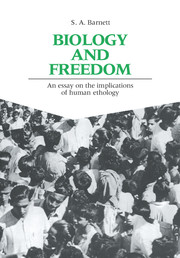Book contents
- Frontmatter
- Contents
- List of illustrations
- Preface
- Acknowledgements
- Part 1 An introduction
- 1 Four portraits
- 2 The pessimistic tradition
- 3 Animals and analogy
- Part 2 Homopugnax: the violent species
- Part 3 Homo egoisticus: the selfish species
- Part 4 Homo operans: the greedy species
- Part 5 Homo sapiens: the human species
- Glossary
- Notes
- References
- Name index
- Subject index
2 - The pessimistic tradition
Published online by Cambridge University Press: 04 August 2010
- Frontmatter
- Contents
- List of illustrations
- Preface
- Acknowledgements
- Part 1 An introduction
- 1 Four portraits
- 2 The pessimistic tradition
- 3 Animals and analogy
- Part 2 Homopugnax: the violent species
- Part 3 Homo egoisticus: the selfish species
- Part 4 Homo operans: the greedy species
- Part 5 Homo sapiens: the human species
- Glossary
- Notes
- References
- Name index
- Subject index
Summary
Is heav'n unkind to man, and man alone?
Alexander PopeThe misanthropic theme in European thought can be illustrated from the words of a few powerful writers, whose views reappear, variously transformed, in current writings on human nature. I begin with the most remarkable of them all.
Ancient pessimism
The whole of western philosophy has been described as a series of footnotes to Plato; but even this understates his achievement. Plato wrote profoundly not only on a great range of philosophical questions, but also on history, anthropology, sociology and politics. K.R. Popper describes him as one of the first social scientists and ‘by far the most influential’.
Plato was a member of one of the wealthy families that ruled Athens in the fifth century BC. In his early years he fought for Athens in her ruinous wars with neighboring city states. In about 387 he founded the Academy, the earliest European university on which we have detailed information. There he attracted a remarkable group of students and teachers; some of the former became prominent generals or statesmen. Women, too, it seems, were among his students. The Academy came to have a substantial political influence, partly through its pupils and partly by giving advice to governments on their legal codes and their constitutions.
- Type
- Chapter
- Information
- Biology and FreedomAn Essay on the Implications of Human Ethology, pp. 7 - 15Publisher: Cambridge University PressPrint publication year: 1989



